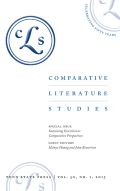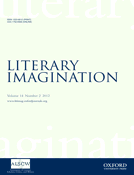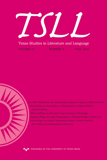
CLIO-A JOURNAL OF LITERATURE HISTORY AND THE PHILOSOPHY OF HISTORY
Scope & Guideline
Challenging Boundaries in Literature and Historical Thought
Introduction
Aims and Scopes
- Interdisciplinary Exploration of Literature and History:
The journal emphasizes the interconnectedness of literature and history, examining how literary works reflect, shape, and challenge historical narratives. - Philosophical Inquiry into Historical Concepts:
It engages with philosophical discussions surrounding historical concepts, including memory, identity, and the nature of historical truth, often through critical analysis of literary texts. - Focus on Diverse Literary Traditions:
CLIO promotes the study of various literary traditions and genres, encouraging submissions that explore non-Western literatures and historical contexts. - Methodological Innovations:
The journal values innovative methodologies in literary and historical analysis, including narrative theory, cultural studies, and postmodern critiques. - Cultural and Historical Contextualization:
Papers often contextualize literary works within their historical settings, exploring how cultural, social, and political factors influence literary expression.
Trending and Emerging
- Memory and Trauma in Literature:
There is an increasing focus on how literature addresses themes of memory and trauma, particularly in relation to historical events such as wars and cultural crises. - Interrogation of Gender and Identity:
Emerging studies often interrogate concepts of gender and identity, examining how literature reflects and critiques social constructs and the experiences of marginalized groups. - Environmental and Ecocritical Themes:
The journal is seeing a rise in ecocritical analyses that explore the relationship between literature and environmental issues, signaling a response to contemporary ecological concerns. - Global Perspectives on History and Culture:
Recent papers reflect a trend towards exploring literature from a global perspective, emphasizing cross-cultural dialogues and the impact of globalization on historical narratives. - Philosophy of History in Literature:
A notable trend is the exploration of philosophical questions regarding the nature of history itself, particularly through literary works that challenge conventional historiography.
Declining or Waning
- Traditional Historical Narratives:
There appears to be a decreasing emphasis on conventional historical narratives that focus solely on chronological events, as the journal increasingly favors analyses that intertwine literature with broader philosophical and cultural discourses. - Eurocentric Literary Perspectives:
The journal is moving away from predominantly Eurocentric literary analyses, reflecting a growing commitment to global perspectives and diverse voices in literature. - Historical Fiction Analysis:
Interest in analyzing historical fiction as a genre has waned, with fewer papers dedicated to this topic, indicating a shift towards exploring historical themes in a broader literary context. - Biographical Studies:
Papers that focus strictly on biographical accounts of authors or historical figures are less frequent, suggesting a trend towards more thematic or philosophical explorations rather than individual narratives.
Similar Journals

Studia Litterarum
Discovering the Essence of Literary Thought and TheoryStudia Litterarum, published by the esteemed Russian Academy of Sciences at the A.M. Gorky Institute of World Literature, serves as a vital platform for the exploration and analysis of literature and cultural studies. With an ISSN of 2500-4247 and an E-ISSN of 2541-8564, this open access journal has been disseminating valuable research since 2016, reaching a global audience keen on advancing the understanding of literary theory and cultural narratives. Based in Moscow, Russia, the journal has achieved remarkable academic recognition, holding a Q2 classification in Cultural Studies and a prestigious Q1 tier in Literature and Literary Theory, as of 2023. Its Scopus rankings underscore its relevance, with a notable placement in the 51st percentile for literature and literary theory and 27th percentile for cultural studies. Studia Litterarum not only opens doors to scholarly dialogue but also enhances the visibility of contemporary literary scholarship, making it an essential read for researchers, professionals, and students alike seeking to deepen their understanding of the intricate dynamics within literature and cultural studies.

COMPARATIVE LITERATURE STUDIES
Unveiling New Perspectives in Comparative LiteratureComparative Literature Studies is a distinguished journal published by Penn State University Press, focusing on the diverse and evolving field of comparative literature. With an ISSN of 0010-4132 and an E-ISSN of 1528-4212, this quarterly journal has been a critical platform for scholarly dialogue and interdisciplinary research since its inception in 2000. The journal proudly ranks in the Q3 category for Cultural Studies and Q2 for Literature and Literary Theory (2023), showcasing its significant impact within these domains. Notably, it ranks #214/1106 in Literature and Literary Theory according to Scopus, placing it in the 80th percentile—highlighting its relevance and quality in the global academic landscape. Despite its traditional subscription model, the journal remains a crucial resource for researchers, professionals, and students keen on exploring the intersections of cultures, texts, and histories. By publishing cutting-edge research and critical essays, Comparative Literature Studies aims to expand the horizons of literary analysis and foster innovative scholarly exchanges.

POETICA-ZEITSCHRIFT FUR SPRACH-UND LITERATURWISSENSCHAFT
Fostering Insightful Dialogues in Linguistics and Literary StudiesPOETICA-ZEITSCHRIFT FUR SPRACH-UND LITERATURWISSENSCHAFT is a pivotal journal published by Brill, focusing on the fields of linguistics and literary studies. Founded in Germany, this esteemed publication showcases rigorous scholarly research, fostering a deeper understanding of language and literature. Although the journal does not currently operate as an open-access platform, it remains an essential resource for academics in these areas, featuring innovative studies that span from 2002, through selected years, to 2024. With a Q4 category in Linguistics and Language and a Q3 in Literature and Literary Theory as of 2023, POETICA ranks among the significant contributors to the arts and humanities discourse. It provides a vital forum for researchers and students to engage with contemporary debates and methodologies, ensuring its relevance and importance in the academic community.

Iberoamericana
Bridging Disciplines: Anthropology, Literature, and BeyondIberoamericana, an esteemed open-access journal published by VERVUERT VERLAG since 2001, stands at the forefront of interdisciplinary research encompassing Anthropology, Cultural Studies, History, and Literature and Literary Theory. Housed in Spain with an operational address in Germany, this journal serves as a vital platform for the dissemination of scholarly work, particularly relevant to the Iberian context and its global connections. With impressive rankings, including Q3 in History and Q3 in Literature and Literary Theory, Iberoamericana promotes academic conversations that enhance understanding of cultural dynamics. The journal's commitment to open access ensures that research is accessible to a global audience, fostering collaboration and innovation. Researchers, professionals, and students are encouraged to engage with this essential resource that not only contributes to their respective fields but also broadens the appreciation of the rich, diverse cultural heritage of the Iberian Peninsula.

Literary Imagination
Cultivating a Community of Literary ScholarsLiterary Imagination, published by Oxford University Press, is an esteemed journal that delves into the intricate world of literature and literary theory. With the ISSN 1523-9012 and the E-ISSN 1752-6566, this journal serves as a pivotal platform for scholars and practitioners in the field, striving to advance the understanding of imaginative literature from various critical perspectives. Boasting a 2023 rank of #751 out of 1106 in the Arts and Humanities category on Scopus, and categorized in the Q3 quartile for literature and literary theory, the journal is recognized for its contribution to the academic discourse. It aims to foster a vibrant academic community through the publication of innovative research, critical essays, and interdisciplinary studies that engage with the complexities of literary creation from 2009 to 2024. While currently not an open access journal, its rich repository of scholarly work remains accessible to researchers, professionals, and students aiming to enrich their understanding of literary narratives and their theoretical frameworks.

RLC-REVUE DE LITTERATURE COMPAREE
Exploring the Depths of Literary DiversityRLC-REVUE DE LITTERATURE COMPAREE, published by DIDIER-ERUDITION, is a prominent French journal focused on comparative literature and literary theory, holding an ISSN of 0035-1466. Established in 2001, the journal aims to foster scholarly exchange and critical analysis in the field of literature, examining texts across cultures and disciplines. With its current categorization in the Q4 quartile for literature and literary theory as of 2023 and holding a Scopus rank of #880 out of 1106, RLC remains an accessible resource for researchers, professionals, and students alike. While it operates under a traditional access model, it continuously strives to contribute to the academic discourse within its scope, enhancing the understanding of literary complexities and intercultural exchanges. Based in the heart of Paris, at 6 RUE DE LA SORBONNE, the journal invites contributions that explore innovative perspectives and methodologies in literary studies through its ongoing commitment to scholarly excellence.

TEXAS STUDIES IN LITERATURE AND LANGUAGE
Illuminating Language and Literature from the Lone Star StateTEXAS STUDIES IN LITERATURE AND LANGUAGE, published by University of Texas Press, is a distinguished scholarly journal dedicated to the exploration of the rich tapestry of literature and language from Texas and its encompassing regions. With its ISSN 0040-4691 and E-ISSN 1534-7303, this journal serves as a vital platform for researchers, educators, and students interested in the intersection of cultural studies, literary analysis, and linguistic inquiry. Despite the absence of Open Access, the journal remains an essential resource for those seeking rigorous academic discourse within the humanities. The journal, established in 1974, has published influential articles that contribute to a deeper understanding of Texas's unique literary heritage, making it a beacon of scholarship in American literature. The impact factor reflects its relevance and engagement in ongoing literary dialogues. We invite scholars and students alike to engage with the rich content provided, ensuring that Texas's literary legacy continues to be studied and celebrated.

AKZENTE-ZEITSCHRIFT FUR LITERATUR
Unveiling New Perspectives in Literary AnalysisAKZENTE-ZEITSCHRIFT FUR LITERATUR is a distinguished journal in the field of literature and literary theory, published by Carl Hanser Verlag, a revered name in German publishing. Operating from Germany, the journal has contributed significantly to literary discourse since its inception. With an ISSN of 0002-3957, AKZENTE has established itself within the scholarly community, despite its coverage in Scopus being discontinued since 2020. It currently holds a Q3 quartile ranking in Literature and Literary Theory for 2023, reflecting a solid position among its peers. Although classified as non-open access, the journal serves as a vital platform for researchers, professionals, and students interested in deepening their understanding of literary analysis and theory. The thoughtful selection of scholarly articles and critical essays featured in AKZENTE not only fosters intellectual exchange but also promotes the exploration of contemporary and historical literary topics, making it an essential resource for those dedicated to the study of literature.

AMERICAN HISTORY
Charting the Course of U.S. History Through Critical AnalysisAMERICAN HISTORY is a pivotal journal published by HISTORYNET, dedicated to the exploration and analysis of historical narratives, events, and figures that have shaped the United States. With an ISSN of 1076-8866, this journal offers a comprehensive platform for historians, scholars, and students to publish and access critical research and discussions in the field. Although categorized in the Q4 quartile in the history domain according to 2023 metrics, its targeted scope from 2009 to 2023 ensures a rich reservoir of contemporary and historical research articles. Positioned at Rank #1711 out of 1760 in the Scopus database, AMERICAN HISTORY caters to a niche audience passionate about uncovering the complexities of American past. While it does not offer open access, its printed contributions are invaluable for those aiming to deepen their understanding of historical context in modern society. AMERICAN HISTORY stands as an essential resource for anyone engaged in detailed historical research and discourse.

Torre del Virrey-Revista de Estudios Culturales
Connecting Scholars to the Pulse of Cultural DynamicsTorre del Virrey-Revista de Estudios Culturales is an esteemed academic journal dedicated to the exploration and analysis of cultural studies on both a local and global scale. Published by AJUNTAMIENTO ELIANA, this journal strives to promote interdisciplinary research that delves into the intricacies of cultural identity, heritage, and contemporary societal issues affecting various communities. With its ISSN 1885-7353 and E-ISSN 2255-2022, the journal provides a platform for scholars, researchers, and students to contribute to the broader discourse in cultural studies. Although the journal's impact factor and Scopus ranks are currently not specified, its commitment to open access promotes the dissemination of knowledge without barriers, making its articles accessible to a wide audience. Located in Eliana, Valencia, Spain, Torre del Virrey is positioned to bridge European and global perspectives on cultural dynamics, thereby ensuring its relevance and importance in the scholarly community.